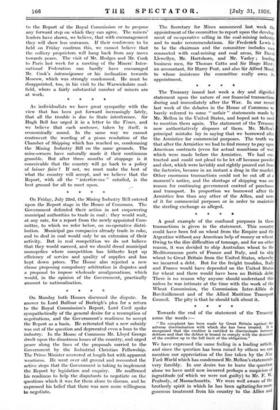The Treasury issued last•week -a dry and dignified statement upon
the nature of our financial transactions during and- immediately after the War. In our record last week of the debates in the House of Commons we barely referred to some " unfair " statements made by Mr. Mellon in the United States, and hoped not to need to mention them again. The statement of the Treasury now authoritatively disposes of them. Mr. Mellon's principal mistake lay in saying that we borrowed after the Armistice for commercial purposes. The truth was that after the Armistice we had to find money to pay upon American contracts (even for actual munitions of war) which were made before the Armistice. We had con- tracted and could not plead to be let off because powder and shot, which were lavishly and rightly poured out from the factories, became in an instant a drug in the market. Other enormous transactions could not be cut off at a moment's notice, and the shortage of shipping was one reason for continuing government control of purchases and transport. In proportion we borrowed after the Armistice less than any other of the Allies, and none of it for commercial purposes or in order to maintain the sterling exchange as alleged.
* *


































 Previous page
Previous page